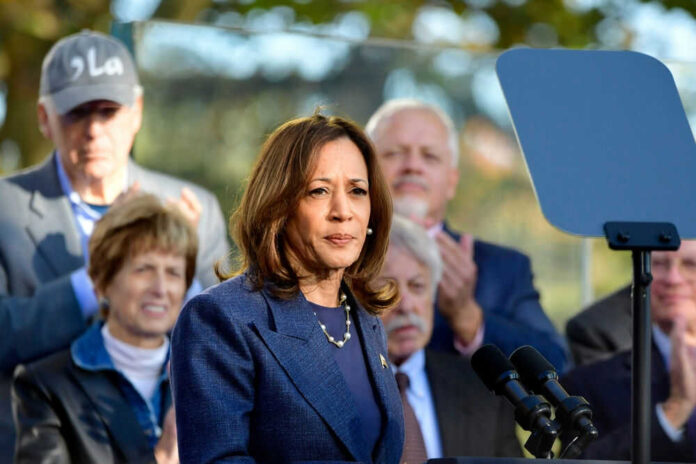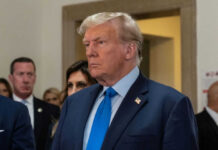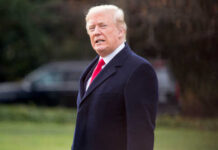
(RightWingJournal.com) – “I’m not president right now”, with that single line, Kamala Harris handed protesters and pundits a new rallying cry, forever changing the rules of political theater on America’s main stage.
Story Snapshot
- Pro-Gaza protesters repeatedly derailed Harris’s book tour debut, demanding action on the Gaza conflict.
- Harris’s candid admission of her limited authority, “I’m not president right now”, became the event’s defining moment.
- The confrontation exposed deep divisions within the Democratic base and highlighted the rising influence of direct activism.
- The episode amplified debates over U.S. foreign policy, protest tactics, and the boundaries of vice-presidential power.
Protesters Steal the Spotlight at Harris’s Book Event
Vice President Kamala Harris’s book tour launch in September 2025 was supposed to be a showcase of personal narrative and campaign optimism. Instead, the event turned into a battleground. Pro-Palestinian protesters, weary of what they see as inaction and complicity from U.S. leaders, seized the moment, standing, chanting, and unfurling banners as Harris took the stage. Their message was clear: the ongoing Gaza conflict is not a remote issue, it’s a moral emergency, and they expected answers, not platitudes.
The protestors’ persistent interruptions made it impossible for Harris to ignore the elephant in the room. She tried to respond with empathy, acknowledging their pain and affirming that “what is happening to the Palestinian people is outrageous and it breaks my heart.” Yet as heckling escalated, Harris pivoted to one of the most memorable lines of her public career: “I’m not president right now.” The phrase, intended to clarify her constitutional limits, instantly ricocheted across social media and newsrooms, interpreted by critics as both a dodge and a subtle critique of executive authority.
Power, Protest, and the Boundaries of Office
This wasn’t a State of the Union or campaign rally, Harris was on a book tour, a non-governmental platform, making the confrontation feel less scripted and more raw. For activists, the moment was strategic. Book tours attract media, and Harris’s visibility made her a prime target for those wishing to spotlight U.S. foreign policy on Gaza. Their tactics mirrored a broader trend: direct action has become the lever of choice for activists frustrated by traditional channels. Disrupting high-profile events delivers urgency and drama, forcing issues into the headlines whether politicians want them there or not.
Harris’s predicament highlights the vice president’s unique power dynamic. She commands one of the highest offices in the land, yet real-time decision-making on foreign policy belongs to the president. Her admission, part candor, part self-defense, underscored the institutional constraints even top officials face, especially when policy is controversial and passions are high. The incident also put event organizers and media on high alert, recalibrating expectations for security, message discipline, and the choreography of public appearances.
Political Fallout and Ongoing Activism
Media coverage of the disruption was swift and relentless, with video clips of Harris’s response going viral. Supporters of the protests celebrated the moment as proof that grassroots action can pierce the bubble of political power. Detractors argued the disruptions undermined civil discourse and distracted from substantive debate. Within the Democratic base, the episode exposed deepening rifts over U.S. support for Israel and the administration’s response to Gaza, a fault line that could reshape voter allegiances as the 2024 election cycle accelerates.
Harris’s campaign and event staff now face a new reality: public appearances are high-risk environments, with activists ready to seize the spotlight at any opportunity. The book tour continues, but with heightened security, tighter messaging, and an ever-present sense of suspense, who will show up, and what will they demand next?
Expert Analysis: The Evolving Playbook of Protest and Power
Political analysts see the incident as emblematic of a broader transformation in American activism. Direct confrontation, once a last resort, is now a preferred strategy for groups seeking rapid visibility and political leverage. Scholars of social movements point out that these tactics, while polarizing, often succeed in shaping public narratives and forcing reluctant leaders to address uncomfortable questions. Foreign policy experts remain divided on the impact of such activism: some argue it can shift the terms of debate, others caution that it may harden positions and reduce willingness to compromise.
The Harris episode will reverberate far beyond the confines of a book tour. It is a case study in the collision between public dissent and the limits of institutional power. As the Gaza conflict continues and the presidential race heats up, expect more confrontations, more viral moments, and more questions about who truly holds the levers of American policy, and how far activists will go to shake them.
Copyright 2025, rightwingjournal.com





























